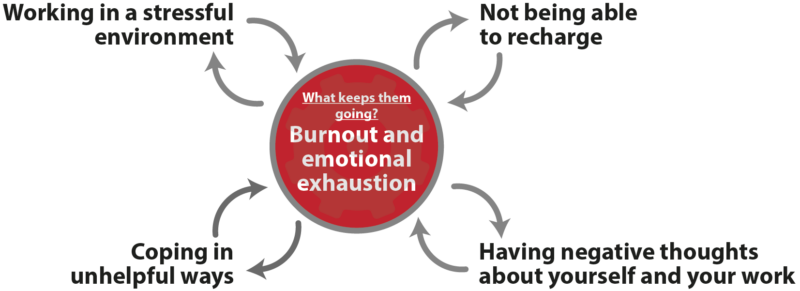Overcoming Exhaustion: How Therapy for Burnout Can Help You Heal

Burnout is a common condition that affects people across various aspects of life. It results from prolonged stress, leading to emotional, physical, and mental exhaustion. Whether caused by work, personal struggles, or life demands, burnout can have serious effects on your well-being. Therapy for burnout offers a path to healing and recovery, helping individuals regain their energy, resilience, and mental clarity. In this article, we will explore what burnout is, how therapy can aid in overcoming it, and the different therapeutic approaches that can bring relief.
What Is Burnout?
Burnout is more than just feeling tired or stressed—it’s a state of chronic exhaustion that severely affects one’s ability to function. People experiencing burnout often feel disconnected from their responsibilities, overwhelmed by life’s demands, and emotionally drained. Common symptoms of burnout include:
- Chronic fatigue that doesn’t improve with rest
- Emotional numbness or detachment from work or relationships
- Decreased motivation and productivity
- Physical symptoms, such as headaches, sleep disturbances, and muscle tension
- A sense of helplessness or being stuck
These symptoms can negatively impact your work, social life, and overall health. Fortunately, therapy for burnout offers essential tools and strategies to address the root causes of exhaustion and begin the healing process.
Why Therapy for Burnout Is Essential
If you’re experiencing burnout, it’s crucial to seek support to prevent further decline in your health. Therapy for burnout helps identify the root causes of your exhaustion, whether it’s due to work pressure, personal expectations, or emotional distress. Addressing these issues head-on with a therapist can help you develop healthy coping mechanisms, set boundaries, and regain a sense of balance.
1. Identifying the Underlying Causes
One of the first steps in therapy for burnout is identifying the specific causes of stress that have led to burnout. A therapist will work with you to explore your work environment, personal life, and past experiences to understand why burnout occurred. By pinpointing these underlying factors, you can take meaningful steps to reduce stress and prevent future burnout.
2. Providing Emotional Support
Burnout often leaves individuals feeling isolated, unsupported, and emotionally drained. Therapy for burnout offers a space where you can express your feelings, work through difficult emotions, and process past experiences that may have contributed to your exhaustion. Having a safe, nonjudgmental space to talk can be a vital part of the recovery process.
3. Teaching Healthy Coping Strategies
One of the most effective ways therapy for burnout helps is by teaching individuals healthier ways to cope with stress. Rather than relying on avoidance or unhealthy habits, therapy provides practical tools for managing stress. These may include mindfulness techniques, time-management strategies, and exercises to improve emotional regulation. By learning these techniques, you can reduce your risk of burnout in the future.
4. Restoring Work-Life Balance
Often, burnout is caused or exacerbated by an imbalance between work, personal life, and self-care. Therapy for burnout can help you create a healthier work-life balance by setting clear boundaries and prioritizing self-care. A therapist can guide you in evaluating your commitments and encourage you to make time for rest, relaxation, and activities that recharge you.
Types of Therapy for Burnout
Several therapeutic approaches can help individuals cope with and recover from burnout. The right approach depends on your specific needs and preferences. Here are some commonly used therapies for burnout recovery:
1. Cognitive Behavioral Therapy (CBT)
Cognitive Behavioral Therapy (CBT) is one of the most effective therapies for addressing burnout. CBT focuses on identifying and changing negative thought patterns that contribute to stress and burnout. By challenging these unhelpful thoughts and replacing them with more balanced perspectives, CBT can help you manage your emotions and build healthier responses to stress.
2. Mindfulness-Based Therapy
Mindfulness-Based Therapy encourages you to stay present in the moment and practice self-awareness. Through mindfulness exercises such as meditation and deep breathing, you can reduce stress and increase relaxation. This therapy helps individuals manage the emotional overwhelm that often accompanies burnout, promoting a sense of calm and emotional balance.
3. Solution-Focused Brief Therapy (SFBT)
Solution-Focused Brief Therapy is a goal-oriented approach that focuses on identifying practical solutions to current problems. This therapy helps individuals break free from feelings of hopelessness and emphasizes actionable steps for improving their situation. It’s particularly helpful for those experiencing burnout because it provides tools to address challenges immediately and begin recovery.
4. Psychodynamic Therapy
Psychodynamic therapy looks at the deeper emotional patterns and unconscious behaviors that may contribute to burnout. By exploring past experiences and unresolved conflicts, this therapy helps individuals gain insight into the emotional roots of their stress. Understanding these patterns can help you change unhealthy behaviors and better cope with future challenges.
When to Seek Therapy for Burnout
It’s important to recognize the signs of burnout before they take a more serious toll on your health. If you’re feeling emotionally drained, overwhelmed by life’s demands, or unable to recover despite taking breaks, it’s time to seek therapy for burnout. Early intervention can prevent burnout from worsening and help you regain your mental and physical health.
Common Signs You Might Need Therapy for Burnout:
- Persistent feelings of exhaustion
- Decreased motivation or sense of purpose
- Difficulty concentrating or making decisions
- Feeling disengaged or disconnected from work or life
- Emotional or physical symptoms like headaches or insomnia
If you identify with any of these symptoms, therapy can offer a path to recovery, helping you feel more energized and emotionally balanced.
Conclusion
Burnout can affect anyone, but it’s not something you have to face alone. Therapy for burnout provides valuable support in managing stress, understanding the causes of exhaustion, and rebuilding emotional resilience. By seeking therapy, you can regain your sense of balance, develop healthier coping mechanisms, and prevent future burnout. If you’re struggling with burnout, don’t wait—take the first step toward recovery today by reaching out to a therapist.






